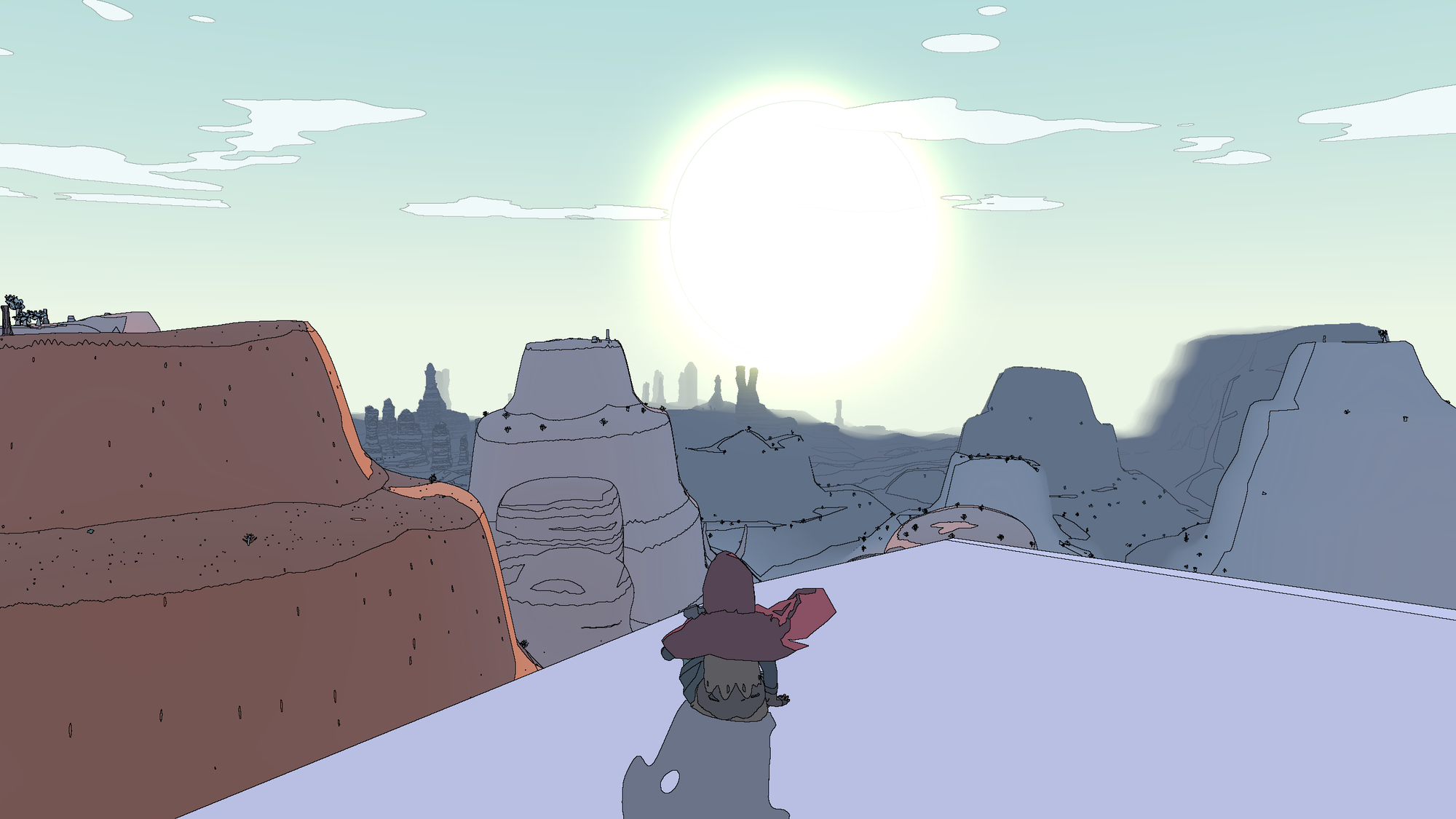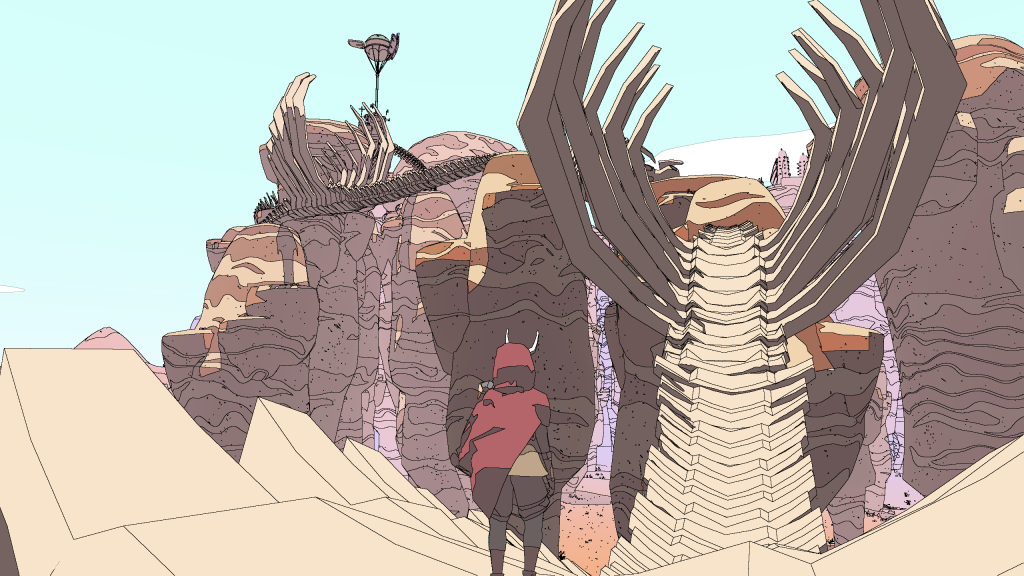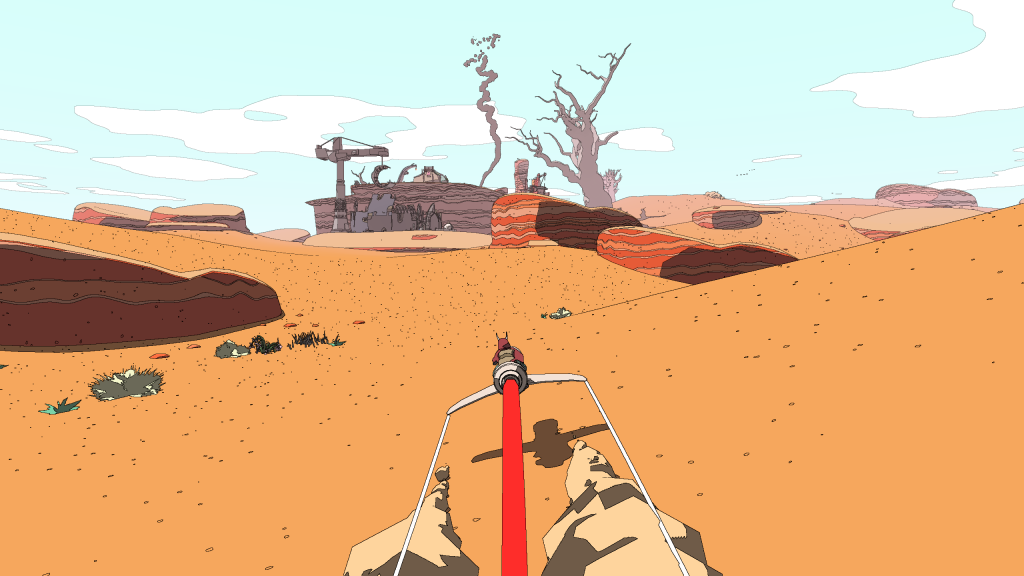
Sable has gotten attention for its striking art style and its lovely soundtrack composed by Japanese Breakfast. But Sable is much more than that. The ambient soundscapes and the stenciled vistas are spectacular, but what made me fall in love with it is the game's structure and writing, particularly through the voice of its young protagonist.
The story begins with Sable, a young girl who belongs to the Ibexii Clan, taking the first steps of a pilgrimage of sorts called a Gliding. After her tribe moves on without her, she is left to explore the world, meet its various inhabitants, and learn about the many crafts and jobs that she may choose as her calling. Along the way, she'll explore the landscape and investigate the strange ruins and mysterious shipwrecks that litter the world.
No Failure
At first glance, Sable seems to be a straightforward platforming adventure game. In the first hour or so, I retrieved my gliding stone, assembled my hoverbike, and set out into the world. But as I did so, I slowly became aware of something that sets Sable apart from its contemporaries. At no point in the game is there a failure state. There's no combat. No health bar. A long fall ends in Sable catching herself at the last minute with her gliding stone. A mistake during a climb simply requires a do-over. There are no fiddly stealth sections, no reset buttons for the occasional puzzles that crop up. It's simply not a part of the game.
This wouldn't be remarkable for a walking sim or visual novel, but Sable is a game about traversal and movement. It's about fearless exploration, telling a story in which its young protagonist is given a safety net with which to explore the world and discover her passions. The world doesn't need combat or difficult platforming to prove itself worth exploring. It's content to let players enjoy floating around on their hoverbike and picking out climbing routes on landmarks and ruins.

More interesting is how this fluidity extends to the objectives Sable pursues on her journey. Early on, she's given one small bit of direction to get her started. But beyond this, the cues to further explore the world are minor. At some point, inevitably, Sable will have to head out in a direction on a vague clue (for many players, it's something like "meet me at the bridge to the southwest"). Inevitably, the small pool of tasks at the earliest area dry up. Progress is ill-defined, and your goals are your own. Exploration is its own reward, and there's never really a wrong way to do it.
Being Sable
Despite the inherent safety of the game's structure, the world of Sable can still feel stark and lonely and sometimes harrowing. It's a world in which living and thriving requires hard work and the help of community. Sable herself is merely wandering through, tasked by those she meets with odd jobs and errands. After all, youths on their Gliding are aimless explorers in pursuit of new experiences. Many characters she meets insist that, surely, the tasks they need her to do are opportunities to learn and grow, yes?
It's a thin pretense for side-questing, but combined with Sable's own eagerness and curiosity, it works well. She's not on a quest to save the world or defeat a villain. She's here to help and learn, and to try to understand the people of the world and the disciplines that they dedicate themselves to. She's quick to adopt new affects and dial up and down certain aspects of her nature to suit the task at hand. She's always herself, but she spends her journey learning to tune her personality to something that best suits her. She dons the theatrics of a clever detective, the decisiveness of a rescue climber, the analytical focus of a scientist. Even when reluctant, she pours herself into the tasks she takes on.

Often when we play open world games, we wander the world accumulating quests and map icons, an ever-growing checklist of inane distractions for our very important protagonist with a very important objective. We indulge our urge to heed distractions and tick boxes, stopping to collect herbs or kill boars or some such; it's a video game, and the fate of the world will wait. But Sable is a character who meshes more easily with the quest log she accumulates. The sense of adventure and curiosity with which she dives into tasks is deeply earnest and believable. It grounds her character in a way that many open-world games inevitably forego in favor of providing Hours of Content alongside an Epic Storyline.
None of this is to say that there's something wrong with grand quests full of silly detours. But it does feel crucial that Sable, the character, has goals aligned with those of the player: to explore the world and find what interests them. Some of the most elaborate mysteries to unfurl in the game are barely even tracked in the journal, and many don't even have markers to find on a map. Its rare to play an open-world game where exploration feels so truly player-driven.
Sable won my heart with its endearing writing, all through the lens of an avid young girl with a big world to explore. The dialogue is fantastic, but so is the sense of enigmatic history etched into the landscapes and ruins. Unravelling mysteries in the world is accompanied organically by Sable trying on different versions of herself. It's hard to choose who you want to be, but it's wonderful to have the freedom to consider your options, and the space to ponder what sort of person Sable has become when her journey comes to a close.